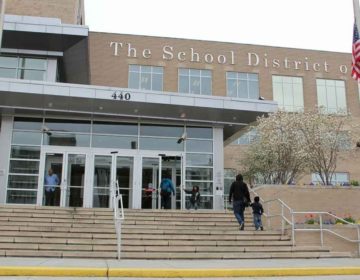Jeopardizing health? Philly principals, teachers leery of plan to distribute 50k laptops
Philly wants principals and staff to volunteer as part of a plan to hand out thousands of Chromebooks. Some say the plan jeopardizes their health.

(TeroVesalainen/BigStock)
The School District of Philadelphia’s plan to distribute roughly 50,000 Chromebooks next week as part of a pivot to virtual learning is facing resistance from principals and teachers who say they’re being asked to jeopardize their health.
Union leaders haven’t formally rejected the plan, but are warning that a significant portion of their members may not show up as part of the in-person system to catalogue, prepare and distribute the laptops.
“How you treat your employees during a pandemic is important,” said Robin Cooper, head of Teamsters Local 502 Commonwealth Association of School Administrators (CASA), the union that represents district principals and school administrators.
“I’m sure there will be some [principals] who stay home and some who will go in,” Cooper added.
Cooper says many of her members are older or look after older relatives. She says they’re wary of interacting with thousands of parents and children across the district’s 200-plus schools in the middle of an intensifying pandemic.
This early snag shows how difficult it may be for Pennsylvania’s largest school district to buy laptops for students that don’t have them at home, distribute them and then shift to a scaled-up version of online learning — all within a few weeks.
“It’s not about getting the children computers. We want to do that,” said Cooper. “But how do you do that?”
The district said in a statement Monday afternoon that it’s taken “many precautions to safeguard staff” while ensuring students get the technology needed to keep learning during the indefinite closure of Pennsylvania’s schools.
“Our children should not fall further behind in the existing digital divide by being denied access to technology at home while they can not come to school,” the statement said. “This Chromebook program is optional both for the adults who have volunteered to support this important work and the families who choose to participate.”
Sources familiar with the school district’s distribution plan say officials are asking each school to find staffers willing to volunteer to take inventory of existing laptops this week.
Next week — between April 6 and 8 — schools are slated to host in-person pickup sessions.
The School District of Philadelphia is planning the unprecedented: a sudden, large-scale distribution of Chromebooks. Perhaps 50,000 of them.
Here’s the procedure the district plans to use, per a source:#PHLed pic.twitter.com/jC9PQTyD32
— Avi Wolfman-Arent (@Avi_WA) March 26, 2020
According to a memo circulated last week, principals are supposed to tell families to call, text or email when they’re arriving to pick up a computer. Each school was asked to find volunteers who could check texts and emails.
The memo said schools are also supposed to have a “delivery team” that will hand out those Chromebooks one at a time, sanitizing surfaces before and after use and maintaining at least six feet of distance during these exchanges.
The district said in a follow-up memo that starting Monday, it will deliver gloves to schools for volunteers to use throughout the inventory and distribution process. It also said schools could decide how many volunteers they need to effectively hand out computers.
There was no mention of masks in either memo, and CASA president Robin Cooper said she does not believe masks — which are in short supply nationally — will be provided. In its Monday statement, however, the district said that “schools starting the packing process are provided gloves and masks.”
The question now is whether schools will be able to summon the volunteers needed to make this plan work.
Asked over the weekend whether his members seemed willing to staff the pickup sites, teachers’ union president Jerry Jordan replied, “I don’t get the sense that they are.”
“People are concerned about their health,” he said. “That is a real big issue.”
District spokeswoman Monica Lewis said Monday morning that leadership had a call with CASA and the PFT on Sunday, and she was still waiting for a report on how and whether the unions’ concerns have been addressed.
In addition to seeking volunteers from schools for the distribution, the latest memo says that if needed, volunteers will be provided by the District’s IT staff, the city and “community partners.”
At a school board meeting last week, the district committed to purchasing as many as 50,000 Chromebooks for students who don’t have computers at home at a cost of up to $11 million. Comcast CEO Brian Roberts and his wife have pledged to cover $5 million, while Philadelphia 76ers co-owner Josh Harris and David Blitzer say they’ll donate enough money to purchase 10,000 Chromebooks.
The district, which enrolls about 120,000 students, said it already owned thousands of school-based laptops that could be distributed to families.
A recent district survey indicated that less than half of Philadelphia’s public school kids have a laptop that they can use to connect to the internet.
The district says it will be creating a list of free, Xfinity Wi-Fi hotspots around the city for families who lack internet access.
The district’s aim is to have students doing online instruction by the week of April 13.
Doling out Chromebooks is just the first step toward that goal. It’s clear the distribution plan won’t be the only concern for educators.
In a poll conducted by the Philadelphia Federation of Teachers (PFT), 46% of respondents said they were either concerned or extremely concerned about balancing online learning requirements with “other work from home issues such as childcare.”
A larger proportion — roughly 62% — said they were concerned or extremely concerned about the district choosing online learning platforms for the remainder of the year.
About 5,000 union members, roughly 40% of the total ranks, responded to the poll within 24 hours, said Jordan — an indication that there’s widespread energy and anxiety around the quick shift to virtual learning.
“We’ve never gotten that kind of response on a survey,” said Jordan.
CASA president Robin Cooper says that when an initial distribution plan was sent to principals last Wednesday, she received a huge wave of responses. About 65% of the district’s 200-plus principals reached out, Cooper said — many of them upset with a proposal that they felt was unfair.
“We don’t want to jeopardize the health and safety of our members,” Cooper said.
—
This story has been updated to include a statement from the School District of Philadelphia.
 WHYY is one of over 20 news organizations producing Broke in Philly, a collaborative reporting project on solutions to poverty and the city’s push towards economic justice. Follow us at @BrokeInPhilly.
WHYY is one of over 20 news organizations producing Broke in Philly, a collaborative reporting project on solutions to poverty and the city’s push towards economic justice. Follow us at @BrokeInPhilly.
WHYY is your source for fact-based, in-depth journalism and information. As a nonprofit organization, we rely on financial support from readers like you. Please give today.



![CoronavirusPandemic_1024x512[1]](https://whyy.org/wp-content/uploads/2020/03/CoronavirusPandemic_1024x5121-300x150.jpg)


